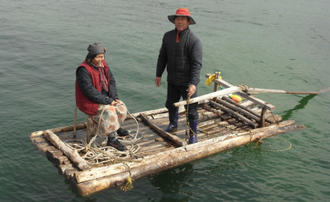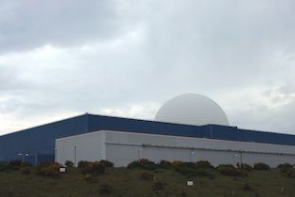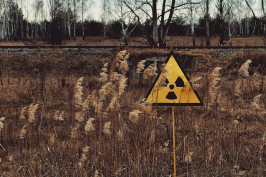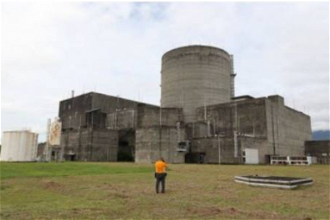We Are All Interconnected

Gertrude and her husband, Credit: Noel Mackey
How are you? My name is Gertrude, and I live close to the sea in Samcheok, Korea, listening to Songs of Praise from the seagulls and the waves. I was baptised by the late Columban Fr Denis McGonagle. Seeing the boundless love of Fr Denis for all the believers, I, too, felt the presence of God. When I was going through difficult times, Fr McGonagle always prayed for me.
When I began to engage in the protest movement against the plan to build a nuclear reactor plant in our area, he told me that he placed the names of my family between the pages of his breviary and prayed for me. He wondered how I could endure the difficulties of such a struggle. He continued to pray for me even when he was struggling with Illness in Ireland. In my last telephone call to him, he told me that he would be soon departing and he said, "be courageous because I will be praying for you in heaven." I am certain that the reason that I am able to continue my activity for the environment, despite all the difficulties, is due to the prayers of Fr Denis.
In 2010, on hearing of the plan to build a nuclear power station in pristine Samcheok, I began my environmental activity by attending protest rallies and Masses. The more I understood nuclear power, the more I realised that it was not just an issue for our locality but a global problem. I became fearful after realising that the ecosystem has reached a crisis point due to human greed and, in fact, the Earth is slowly dying. Every Wednesday evening, I participated in Mass holding a candle with a desperate heart. One year after the nuclear accident at Fukushima in Japan, I took part in the Korean-Japanese Catholic Nuclear Energy Divestment Exchange. Due to the help of such solidarity and the protest movement of the citizens of Samcheok, the plan for the nuclear power station in Samcheok was cancelled after 10 years.
However, then came the news that a coal power station would be built in Samcheok. There is already a coal power plant in operation and another one within three kilometers in Donghae City. The blue power Samcheok Coal Power Plant, being built by POSCO (210,101MW), is equivalent to two nuclear power stations and is within five Km of the city. Many of the Samcheok citizens are dependent for their livelihood on marine products and agricultural produce, and Samcheok supplies food throughout the country. It is a well-established fact that the ash of burned coal is a carcinogen carried in the air which pollutes marine products and destroys our bodies, so pushing ahead with the building of the coal plant is nothing but a suicidal action. And the construction of a harbour to receive the coal is resulting in the disappearance of Maengbang Beach!
As our Earth was becoming diseased, I, too, contracted an illness. When in Seoul for an operation, I heard about the picketing activity each Friday in Gwangwhamun Plaza by members of the Global Catholic Climate Movement (now the Laudato Si' Movement). I made my picket (sign) and went to Gwanghwamun, where I met a Columban, Fr Pat Cunningham. I shared with him the situation in Samcheok, and he joined me to protest the building of the Samcheok coal plant, as also did the Columban Lay Missionary Noh Hyein Anna.
Shortly afterwards, Columban Fathers Jude Genovia and Peter Dong, together with Columban associates, visited Samcheok and have been working with us to the present. I feel the solidarity with the Columbans to be the wonderful solidarity of God. Samcheok is a place where Columban missionaries worked a long time ago. I believe that the seed they scattered in difficult circumstances has borne fruit in our work today for God's project.
Even though we do not sow seed, the sea gives us boundless food and resources, but now, this food is depleted due to our wrong choices. In Autumn, from dawn to dusk, we used to catch squid for drying, but now we rarely catch squid. The sea has warmed to such a degree that one can now swim in it in October. Each morning I see the waste and trash carried in by the waves. As I collect half plastic bottles, l feel fear as I think of the other half already digested by fish and ending up in our bodies. Before, I would get angry thinking about that person who lacked common sense and threw away rubbish, but now I think maybe it is rubbish thrown away thoughtlessly by my family which is coming back to us or me! Thinking that water with radiation from Fukushima will come to the sea beside us, I imagine the sea creatures, from the plankton to the whale, unable to defend themselves just dying. I feel guilty, so I go out to the beach and collect the rubbish in the morning.
One little initiative of our family is to live without a private car. I now consider the discomfort of waiting for a bus as a time to relax, I am happily living the joy of dawdling! We do not have a motorboat. We catch our fish quota for the day using a raft.
We are all interconnected. The person is part of nature also!
Columban Fr Donal O'Keeffe translated this article.


















